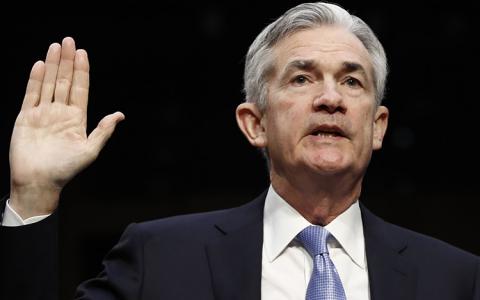
The chairman of the Federal Reserve on Sunday said the central bank has not exhausted its power to help the economy get through the coronavirus pandemic.
“We’re not out of ammunition by a long shot,” Powell said in a transcript of his interview aired on the CBS news magazine “60 Minutes.”
The Fed chairman said there was “no limit” to what the Fed can do to lend money to financial markets.
“So there’s a lot more we can do to support the economy, and we’re committed to doing everything we can as long as we need to,” Powell said.
Earlier Sunday, Mohamed El-Erian, the chief economic adviser at Allianz, the corporate parent of Pimco, said he was concerned that investors were counting too much on Fed support to get the economy through the crisis.
Powell said the Fed could enlarge existing lending programs or start new ones. The central bank’s balance sheet is already approaching $7 trillion.
The central bank could try to lower interest rates to make commitments about the future path of policy, a strategy called “forward guidance,” or could also “change our asset-purchase strategy,” Powell said. That’s a reference to the hundreds of billions of dollars of Treasurys and mortgage-backed securities the Fed has been buying.
He repeated that Congress is likely to need to spend more money to keep businesses and households from becoming insolvent.
Powell said now is not the time to worry about the long-term consequences of this debt spree.
“It is true that deficits are going to be big for a couple of years here. And we’ll have to deal with that. The time to deal with that, though, is when we’re through this recovery,” he said.
The consequence of stopping spending now risks “longer-run damage to the productive capacity of the economy and to people’s lives,” he said.
Powell’s biggest concern seemed to be a potential “second wave” of the coronavirus. Health experts are divided over the risks of a spike in cases later this year. The Spanish flu pandemic in 1918 had three waves.
“It’s very important to avoid that, very important,” Powell said. Such a development would cause another downturn and be bad for confidence, he said.
He acknowledged that the statistics about the spread of the coronavirus are almost more important that the economic data that the central bank routinely monitors.
“The thing that matters more than anything else is the medical metrics,” he said.
The April-June gross domestic product report “will be very, very bad,” with an annualized growth decline that could easily be “in the twenties or thirties,” he said.
There will likely be “a couple more months of net job losses” before the unemployment rate peaks in a range of 20%-25%, he said.
The Fed chairman waved away comparisons with the Great Depression of the 1930s. “It should be a much shorter downturn than we would associate with the 1930s,” he said. The Great Depression lasted for 10 years.
Powell said he thinks the economy will start to recover in the July-September quarter, but it will “take some time to pick up steam.”
“The main thing is to get back on the road to recovery. And I think that can happen relatively soon,” he said.
While the economy won’t get back to where it was in December 2019 by the end of this year, he said once the economy is on the road to recovery, the Fed will try to keep it on the road for a long period of time.
In a clip released earlier by CBS, Powell said he would not bet against the American economy.
Asked when he realized how serious the pandemic was, Powell said it didn’t come suddenly, like a light switch. “We saw it coming,” he said.
This article originally appeared on MarketWatch.



